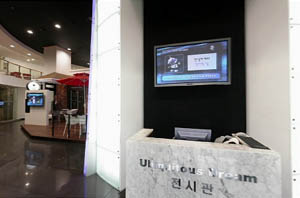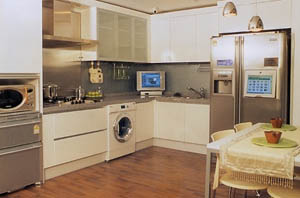What if short-range time travel were possible, affording you a glimpse of the near future? What if it were as simple as buying a plane ticket? For anyone looking for tangible clues as to where today’s info tech proliferation might be leading us, a Korean Air jet to Seoul might be the closest thing to a time machine currently available. Over the past decade, South Korea has emerged as the ultimate high-tech society, making our own gadget-crazed culture look provincial by comparison. A huge portion of the Korean economy (domestic and export) is devoted to information communications technology, Korean cities lead the world in broadband penetration, and nearly three quarters of South Koreans subscribe to cellular phone services.
And that is only the beginning. The government recently announced its vision for “u-Korea,” a plan to achieve “ubiquitous communications” across the country through a blitz of products, services and infrastructure, as well as computer literacy programs targeting rural areas and the older generations that have been unable to keep up with Korea’s evolution toward network totality. An article in the Bangkok Post describes the initiative (via Smart Mobs).


Among the planned “ubiquitous” services are internet telephony, digital multimedia broadcasting, and enhanced wireless broadband coverage that can be enjoyed at speeds of up to 60 kilometers per hour. National Computerisation Agency (NCA) president Dr Chang-Kon Kim says the goal is for total broadband coverage across the country by 2007. When all of this comes together, Koreans will find themselves living in a totally wired society where handheld devices (a cross between a powerful PC and a mobile phone) are the keys to the environment.
To offer its citizens a window into the future, the Korean Ministry of Information and Communication has set up the “Ubiquitous Dream Hall,” an exposition space in downtown Seoul where visitors can explore the predicted technologies and begin to imagine new ways of life that might develop around them. There you can see a household where appliances, smoke alarm and stereo system are all wired into the same network, and family life centers around an interactive television; or a cafe where cappuccinos are ordered on wall-sized touch screens, then delivered by little service robots; or a car that instructs you where to drive; or a new form of interactive street advertising in which images on the floor change in response to pedestrians’ footsteps. The Dream Hall also features an exhibit charting the development of household and communication technologies over the past 30 years, projecting u-Korea into a historical continuum. Whether ubiquitous communication will result in a better life for Koreans remains to be seen, but the government is betting it will be a surefire strategy to keep the economy booming. I’d be concerned for Korea’s sanity.
See also in Ohmy News, Korea’s citizen newspaper:
“International Citizen Reporters Get a Taste of IT Korea”
“In the Future Your House Will Nitpick You”
if:book
A Project of the Institute for the Future of the Book
